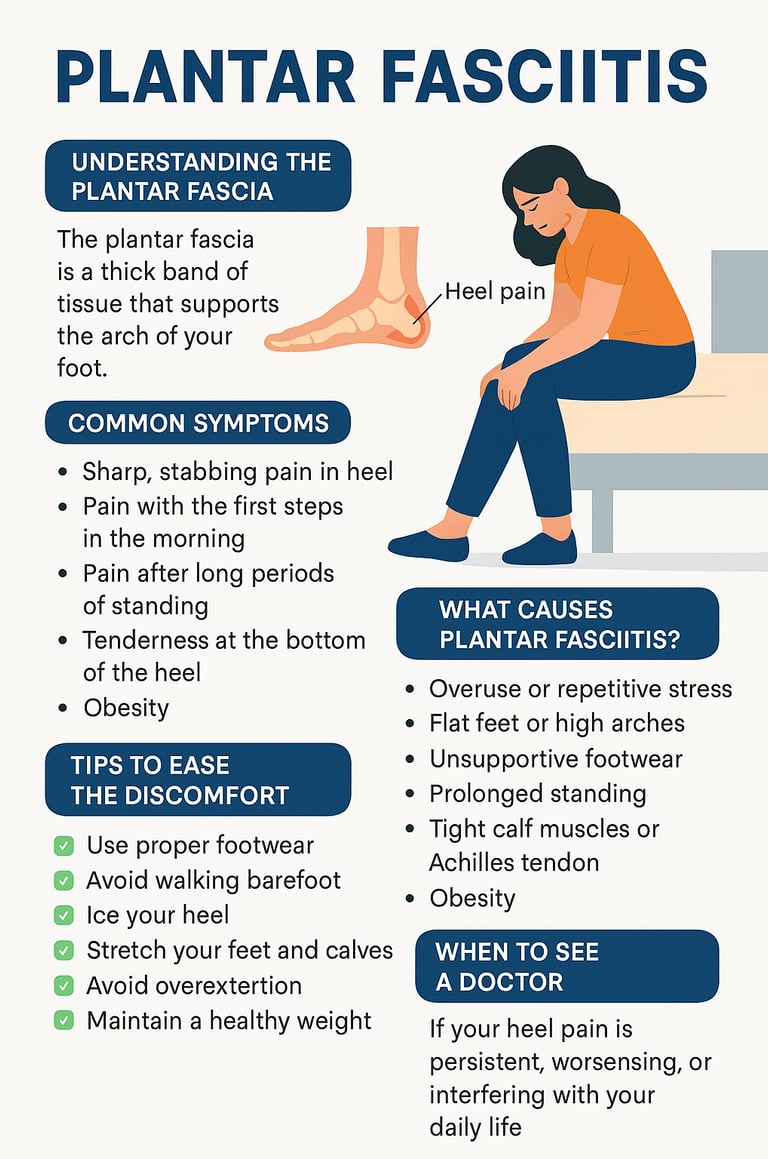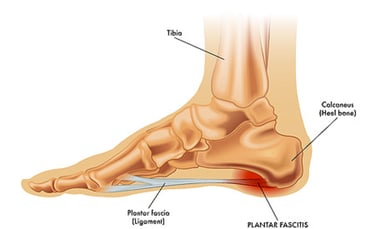What is Planatar Fascitis?
Dr. Satvik N Pai
What Is Plantar Fasciitis?
Plantar fasciitis is one of the most common causes of heel pain, especially in adults who are active, spend long hours on their feet, or wear unsupportive footwear. It can affect anyone—from runners and athletes to those with sedentary jobs who suddenly increase their activity levels.
Understanding the Plantar Fascia
The plantar fascia is a thick, strong band of tissue that connects the heel bone to the toes. It supports the arch of your foot and acts like a shock absorber when you walk, run, or stand.
Over time, due to stress or strain, small tears can occur in this tissue. Repeated stress on these tears leads to inflammation—this is called plantar fasciitis.
Common Symptoms
Sharp or stabbing heel pain, especially with the first steps in the morning
Pain that improves after a few minutes of walking, but returns after long periods of standing or sitting
Pain after exercise (not usually during)
A tender spot at the bottom of the heel
What Causes Plantar Fasciitis?
Overuse or sudden increase in activity
Flat feet or high arches
Wearing unsupportive footwear, especially on hard surfaces
Standing or walking for long periods, especially on hard floors
Obesity, which puts extra pressure on the feet
Tight calf muscles or Achilles tendon
Who’s More at Risk?
Runners, dancers, athletes
People with occupations that involve prolonged standing (e.g., teachers, healthcare workers)
People aged 40–60
Those with abnormal foot mechanics
Tips to Ease the Discomfort
While proper treatment should be guided by a healthcare professional, here are a few simple tips to ease discomfort:
✅ Use proper footwear – Choose shoes with good arch support and cushioning.
✅ Avoid walking barefoot, especially on hard surfaces.
✅ Ice your heel – Apply an ice pack wrapped in a cloth for 10–15 minutes, a few times a day.
✅ Stretch your feet and calves regularly. Gentle stretches can reduce tension on the plantar fascia.
✅ Avoid overexertion – Modify or reduce activities that aggravate your pain.
✅ Maintain a healthy weight to reduce stress on your feet.
When to See a Doctor
If your heel pain is persistent, worsening, or interfering with your daily life, it’s important to consult a specialist. The earlier it is addressed, the easier it is to manage.
Plantar fasciitis is treatable, and with the right guidance and support, you can get back to pain-free movement. If you're experiencing symptoms, don’t ignore them—early intervention can make all the difference.






Having Pain in your Heel or foot?
Come see me and we will together decide what the best possible treatment is for you or your loved ones.
Ortho Med Centre
Timings: Monday- Saturday
5:30pm - 7:30pm
Address: 776, 36th Cross Rd, Near BWSSB Water Tank,
4th T Block East, JAYANAGAR, Bengaluru - 560041.
Landmarks: Near Taazi Thindi, SSMRV College
For Appointments Call:
080-4130 1828
080-4130 1838
Reception will be open to take appointments on Monday-Saturday from 9am- 8pm.




